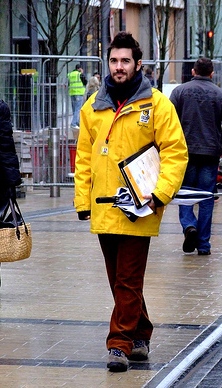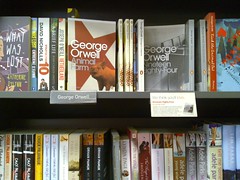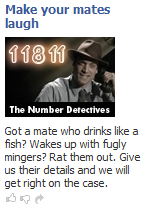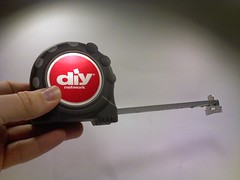We’ve created a page listing PR companies in Ireland. It’s one long flat page right now but we hope in time to create a proper directory listing all of these and their various presences online. If we’re missing some or some of the details need changing, leave a comment, send an email, arrange a photoshoot outside our office…
Blog
Social Media tidbits – July 2nd 2009
Online PR is more than a numbers game says Bespoke. Too right.
We are social worked on a fascinating Loop the Loop campaign.
Numbers. You can measure it. Supermegapost about measuring and evaluating sponsorships and events.
A workable advertising model?
Content is free and advertisers pay because they can target by default. If consumers choose to turn targeting off, they can pay or forgo the content.
This is how to use an iPhone to market. Add value. See what Absolut did?
Online Marketing tidbits – June 29th 2009
Nike+ fascinates me. The amount of data it gathers and shares and the way it connects people together is utterly fantastic. A great example of community building. Bring people together and give them the tools to share and they’ll inform you of what you can do for them. This Wired article goes though great detail about it.
Nike has attracted the largest community of runners ever assembled—more than 1.2 million runners who have collectively tracked more than 130 million miles and burned more than 13 billion calories.
And you can upload your jogging data to Twitter.
How Edelman works with Mommy bloggers.
Looks like your Facebook status updates will now be world-public. Expect ads showing up in your profile based on them too.
Here’s how to get your Facebook username back.
Knowledge is Power – June 25th 2009
Some more stats from Facebook via Nic:
Facebook’s 200m members add 4bn pieces of info, 850m photos and 8 million videos every month.
Google says video uploads from mobiles to YouTube up 400% due to iPhone 3GS
The Social Media Quiz for Govt orgs.
Habitat totally fucked up by hijacking Twitter discussions about Iran to pimp their products. How utterly damaging.
Facebook Profile results in Google now give more details.
but when a Facebook user’s profile is returned in Google’s search results, you can now see the user’s location (or network) and a random selection of their friends, as shown on their public profile.
SEO tips for building your personal brand. Personal brand, eugh what a phrase.
Numbers and new thinking in social media – Monday June 22nd 2009
A new academic paper on ReTweeting on Twitter. 8,000+ words about ReTweeting. That’s 50,000+ characters which is about 364 full Twitter messages. Uhm, overkill anyone? If you ignore the awful academic language and the stupid opinions about no proper rules, there are some good stats there:
- 52% of retweets contain a URL
- 18% of retweets contain a hashtag
- 11% of retweets contain an encapsulated retweet (RT @user1 RT @user2 …message..)
- 9% of retweets contain an @reply that refers to the person retweeting the post
Value is king. Helge hits the nail on the head when talking about the future of marketing. Add value, don’t get in the way of someone, don’t broadcast. Helge once again shows why he’s at the cutting edge of online marketing.
Foreverism encompasses the many ways that consumers and businesses are embracing conversations, relationships, and products that are never done. Driving its popularity is technology that allows them to find, follow, interact and collaborate forever with anyone & anything.
Ad recollection stats. Ads that run on websites with related content are 61% more likely to be recalled than ads running on sites with unrelated content.
The study also revealed that social network, shopping, and food sites generate the highest recall levels (29% to 39%)
Making sense of search positioning. Harder than it looks, right?
Online Marketing/Social Media stats for Ireland and elsewhere
Some stats:
There are now 750,560 people on Facebook in Ireland
512,820 of them are 25 or older (That’s 68%)
334,040 are 30 or older (44.5%)
When Tweetrush launched, Twitter was pumping out over a million messages a day. Soon after it started hitting 2 millions messages a day.
10 months later and now Twitter is pumping out nearly 9 million messages a day with highs of 350,000 messages some hours.
Very comprehensive social media stats for 2008.
Don’t choke on the size of your membership
Bud tweeted the other day about the numbers game in online marketing/social media.
“Accruing people into one click fan relationships isn’t success”
Get X twitter followers, get X comments, get X Facebook fans. They’re the initial connections yes but not the endgame.
Bud tweeted the other day about the numbers game in online marketing/social media.
Accruing people into one click fan relationships isn’t success
Get X twitter followers, get X comments, get X Facebook fans. They’re the initial connections yes but not the endgame.
So while a few comments on your blog are the very weak connections, something slightly less weak are fans of your Facebook page or YouTube subscriptions. When you update, they get told about it. If you don’t update, they’ll start to forget about it. So you have you connections so you best start looking after them. Add value add value add value.

Photo owned by jennaddenda (cc)
Add value to the 10 you have on Twitter while you still have 10 and don’t go out and follow everyone that mentions your business area. Work with the smaller numbers first. Work the inches first. It’s good for you and them. You’ll learn a lot even with small numbers. Try things out too and see what happens.
Subscriptions mean you have our attention, now don’t screw it up son. Numbers are fine if people don’t know how to measure real value. Numbers describe actions, not the value of those actions. It’s like knocking on 10 doors and converting them all to mormonology and knocking on 100 doors and getting no converts. You have to do more than just gather numbers.

Photo owned by maryatexitzero (cc)
For Twitter:
Interactions with your account. How many people interacted by asking you without solicitation about something? How many people follow these people who interacted on Twitter and so saw that interaction? That’s a better number than your followers number.
How many retweeted your information on Twitter?
How many times are people referencing @yourUsername
How many are clicking on a unique measurable link from your Twitter profile/Twitter messages?
Facebook Fanpage
Attending your event, how many?
Following a unique measurable link from your facebook page?
Interacting with you on Facebook?
How many times are your social ads clicked on in Facebook after someone becomes a fan? What’s the activity like on your Facebook page?
Website:
How many times do specialist sections on your site get linked to from blogs and websites after running a FB campaign for that page?
YouTube:
How many times have your videos been watched?
How many websites have embedded the videos?
How many times have the videos been directly linked to?
How many subscriptions for the channel based on first day of new video, over a week, over a month. Track increase in channel subs just for one video.
Has your video got annotations asking for people to subscribe?
Seeing the value now?
Yes your business and you can screw up in public
A good point was made to me of late and that is of companies afraid to join the online web community for fear of the reaction. They highlight the bad cases. For some that’s just an excuse. It’s the headache to avoid sex, right? And? Here’s the sad fact of life: Even Mother Theresa was hated. The cow.
A good point was made to me of late and that is of companies afraid to join the online web community for fear of the reaction. They highlight the bad cases. For some that’s just an excuse. It’s the headache to avoid sex, right? And? Here’s the sad fact of life: Even Mother Theresa was hated. The cow. That’s just humans for you. Hiding from this though means you hide from the 99.99% of people that will be neutral towards you/like you/love you. If you want to mix with the real world then you need to stick your neck out.
If there are negative comments there are going to be positive comments too, probably way more. Being afraid of potential negative comments ore reactions and allowing them to dictate online reactions will poison your company.

Photo owned by Phillie Casablanca (cc)
Maybe companies should have more faith in not screwing up? However if they do mess up, they need to realise that being genuine about what happened and communicating it will help an awful lot.
There are tonnes of cases of companies getting the crap kicked out of them online. I’m an example myself for having a very short fuse with companies that invade my email or online space without having manners. People think life is too short to get worked up, I think life is to short to let some fucker walk all over you and let them off because they’re thick or invariably, lazy. That’s me, not you.
Anyhoo… a subtlety about being online is that while a screwup can cause an online riot, it can cause just a mild stir too or nothing. Bloggers screw up from time to time and sometimes there are outcries and threats of hate-sites and then people move on, something else happens to catch the magpie eye. People understand screw-ups and if t can be relayed to those online why the screwup happened and that there is genuine regret, most people will say “That’s grand so”. It also helps if you are already active online and are known to people before the screwup. That’s the biggie. Before you do anything, try and not be a stranger. Be known by being there in some way. Emails to people complimenting them on what they do, comments on their blogs. Genuine commentary, not commentary to tick a box next to “Being there”.
Another way of being there is to start interacting on Boards.ie or create a space on IGOPeople and gently get involved there.
Dominos and the issues with staff doing horrible things to their pizzas got worldwide attention within hours due to the virality of YouTube and Twitter and Dominos responded quite quickly with their own YouTube video. Dominos were not on Twitter or YouTube or had much of an online presence before this, that’s now changing. Were they online and had a presence they probably would have known of this sooner and reacted sooner. The event would still have happened but maybe it would not have spread as much. Imagine if Dominos just released a press release?
For very large companies/brands, your first adventures in opening yourself up to the world might end up with lots of people shouting at you for years of crappy service or that 1% of crappy service when 99% of it was great. Think of the tech support hotline where you might get someone ranting and raving at an agent about some computer issue and then they end it with thank you. Initially your customers might need to vent.
At the recent blogging event in the EU Commission’s office EU Commissioner Margot Wallstrom spoke via video to a load of bloggers and talked about her first few blog posts got hundreds of negative comments from anti-europe people. She addressed some issues and ignored some of the madder stuff. She kept blogging and slowly more and more of the comments became more positive. The people that ranted for probably not being listened to up to now realised they were being listened to and became more constructive.
If you as a company realise a percentage of your customers are pissed off at you and so this is a reason for not opening up, then maybe the transparent nature of the web is not for you. Ownership is changing, copyright is changing. People feel loyal to brands and companies and give over energy to support their following and so feel they have a little ownership of the entity. Owners look after what they own.
We live in a prudish world where what we do on our free time and then stick up on Facebook might be used against our employers and so our employers don’t want you to do this. Imagine if instead they said “so what?” and told anyone complaining that they fully back their employees. Online, we, the ones that play around here a lot, we do say the “so what’ bit.
So please, join, accept, return the comments, screw up, don’t screw up, have fun and benefit.
MeasurementCamp lands in Dublin, first one May 27th 2009
Analysis is like sunlight, it’s a great disinfectant. If something can be measured and analysised properly then it can have a real value. Online campaigns can be evaluated and companies and their clients need to know this. It’s not guess work. It’s not throw fifty grand at something and being told a few comments are the way to see that it worked. MeasurementCamp, the regular meetup of people who want to measure the effect of social media style campaigns now has a franchise in Dublin. Hooray for MeasurementCamp Dublin. Will McInnes is the founding father of the cult of the MeasurementCamp and now we are having one in Dublin and I hear it’ll be in more cities soon. Good.
Unlike MeasurementCamp in London, the “scene” in Ireland is still very much in the gestation period so as McampDublin gets going there will probably a lot more learning and teaching about the basics before we can up a gear. Switched-on PR and Marketing companies in Ireland are the exception rather than the rule but the appetite to learn about all these new areas is ferocious by a significant number of companies involved in communications. One of the main tasks too is to make sure and enforcing by beatings if need be (well maybe not) that people don’t try and do sales pitches. Both developers and PR/Marketing folks. It’s a habit that can be broken. We want case studies of both campaigns that worked and didn’t work backed up with how these case studies were measured. MeasurementCamp is about sharing so those coming along will be asked to give to the group.
The first MeasurementCamp Dublin takes place on May 27th starting at 10am in the Odeon, with thanks to Fleishman Hillard for organising this venue and sponsoring it. There are 30 people signed up fo far, most of them from the dev side of the equation. We’ll hopefully see a rebalance with that closer to the day as the PR and Marketing companies become aware of this. Please sign up on the page above and come along if you’re interested in contributing to making the online PR and Marketing industry in Ireland better.

Photo owned by Todd Huffman (cc)
Marketing – A game of inches
On this team we fight for that inch. On this team we tear ourselves and everyone else around us to pieces for that inch. We claw with our fingernails for that inch. Because we know when add up all those inches, that’s gonna make the fucking difference between winning and losing! Between living and dying! I’ll tell you this, in any fight it’s the guy whose willing to die whose gonna win that inch. And I know, if I’m gonna have any life anymore it’s because I’m still willing to fight and die for that inch, because that’s what living is, the six inches in front of your face.
Al Pacino in Any Given Sunday.
I’ve been thinking about marketing for a while and what works and what doesn’t work and I wonder if the distance between the marketing and us is a factor. Close and personal marketing is where it really has a positive effect but there are many obstacles and filters preventing this. Good. There should be.
Think about the various forms of marketing and advertising that are there. They’re sent out from people thousands of miles away and made and distributed hundreds of miles away. With old tech the cost of sending a tailored message to one person was huge but a bland message to thousands was cheap. Broadcast. With new tech it is becoming quite cheap and almost free to market to every individual and respond to each and every piece of feedback from every individual.
The Internet can be thousands of miles away or it can be inches depending on who uses it and in what way. It can remove geographical restrictions but at the same time add new ones that can slow sales and marketing. The biggest one is the inability to personally react to a person.
The best form of marketing is all about how close it is to you and how it reacts to you and gives you what you need, not what they need you to do. Long-distance relationships are hard to do.
Consider some of these forms of marketing:
TV and radio – thousands of miles to dozens with Satellite or broadcast from a tower. Shotgun approach to marketing but with advertising as well as TV shows and their content. Barely knows anything about you, they can’t react to you. Tethered to JNLR figures. The online equivalent is a website, the plain old brochureware type sites, splash page or no.
Billboards – Big large posters hundreds of yards away. Can know a little more about you due to your location and from rough surveys. Still doesn’t know a lot about you, not age, gender or interests. “Works in financial district”, oh great. The online equivalent are banner ads (thus the name).

Guy with sign in town – Local but broadcast
50 feet to three feet away. Holds the sign announcing what they do. Don’t know you, don’t make effort to know you. The online equivalent is a website, maybe these are banner ads that guess stuff based on your IP address. These are people announcing crap on their Twitter profile that use it as a one way method to get news out there. While they’re in your local area like the town or twitter, they’re not actively contributing.

Chugger marketing
It’s personal. Some of the nasty creatures put their hand out which many people instinctively respond to by matching it. Then they grasp on and try to sell. These are the people who are conferenes put their hand up to ask a question and instead promote the work they’ve done. “I’ve found when I did X work for a client that”. Online these are the people that respond on mailing lists, LinkedIn, blog comments and Twitter whoring their stuff and not actually giving a damn if they are relevant or not to you. (Pic above from Lette)

Photo owned by markhillary (cc)
Bookstore Recommendations
Did you ever notice the personal recommendations from Waterstone’s staff on little cards on the bookshelves? A person recommending something to you. It has a little more power than just a “buy this book” type card. The online equivalent is a blog of a business recommending products or highlighting a recent product. Amazon tries to do it but it’s automated, cold and misfires a lot.
Online Reactive Marketing:
Google Adwords are a good example of designing ads based on what you want. You tell Google what you want when you enter a search term and Google spits it back to you in the results but it also acts as a guide to commercial companies that want your attention. It in a way reminds me of the very competitive restaurants you walk past in various holiday resorts. You go down the streets hunting for food and the salespeople try and sell you the restaurant’s charms.

Facebook demographic marketing
Facebook don’t know what you want. You’re on a social network, not searching. So they just make the ads on it much more personal. They’re still ads though and as yet are not based on your actions or your wants. They know lots about you but they can’t see your reaction and respond to it. It’s getting personal but not personal enough and is done on Facebook and when an ad is placed on a profile it’s in conjunction with 2-3 other advertisers too. That dilutes the message too. Unlike Google Adwords, the inclination to click on the ads isn’t strong. They do not answer the question in your head or one that you asked a few minutes ago, do they? The offline equivalent of this is loyalty cards in Dunnes or Brown Thomas.

Photo owned by Rachel from Cupcakes Take the Cake (cc)
Value added local marketing – Austin in Bubble Brothers’ shop in the English Market
Austin is two feet away – you have a relationship, communications are two way. You chat about the weather, you bring in local events, you ask Austin about wines and what would work best with what food. You use his expertise, he shares it with you. He’ll recommend a few selections and ask your price range. You know he’s not there to make you pick the most expensive bottle. You’ll come back and he’ll ask how you got on with that wine. The online equivalent is a blog and leaving comments or going on Twitter and asking @bubblebrothers direct.
My friend/my work colleague/my shared situation person
In the office you might ask for a recommendation for a good Italian restaurant or back to the wine idea, you might ask for recommendations on a good Italian red wine. This shared space can be virtual where you can ask in the status update in Facebook or ask on Twitter. You get answers back from the personal network you have. Anyone recommend some wine to go with this? Online you might see Mike from Curious Wines on Twitter reply to that information request and you’ll respect his opinion as he’s the wine expert or you might respect that of an office colleague who knows a bit about wine. Being of use to the wine searcher or to the person the wine searcher goes to is personal marketing. It’s close enough to be reactive and works well enough that the relationship will remain personal over time.
As a company or a marketer, how are you fighting for those inches? How are you getting to know your customers and letting them get to know you?


